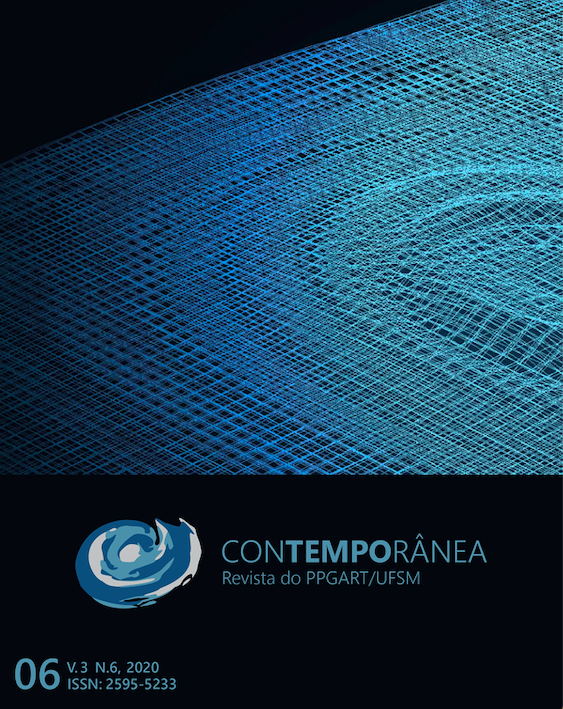The veridical travel of the truly imaginary plant: Curatorial approach and underlying ideas
DOI:
https://doi.org/10.5902/2595523363553Keywords:
Artes Contemporânea, Arte e Tecnologia, Global e Local, Arte e Natureza, Projeto Colaborativo, The Traveling Plant.Abstract
O projecto The Traveling Plant é um projecto colaborativo que se desenvolve através de uma rede global e tem o objectivo de ser partilhado localmente. Pretende lidar de uma perspectiva composta numa série de ações que impactam o global e vivem na localidade, transparecendo e projetando uma variedade de modos de fazer e de ver; de modo a abraçar a dualidade de práticas partilhadas e troca de saberes presente numa rede distribuída de forma virtual e física/não-virtual. Procura lidar com as questões de um fazer concentrado em perspectivas para além do simplesmente humano, que incluem o não-humano e procuram evitar formas colonialistas e antropocénicas de agir e estar. Este artigo apresenta uma estratégia curatorial e as suas questões adjacentes que o grupo de comissárias toma como ponto de partida, a estrutura organizacional para o desenvolvimento do projeto e clarifica como se vai desenrolar.Downloads
References
Filippi, Lavinia: The semi-nomadic curator: Towards an informed, translocal and collaborative approach. Dissertation, Royal College of Art London, Curating Contemporary Art, 2016.
O’Neill, Paul: Biennial culture and the emergence of a globalized curatorial discourse: curating in the context of biennials and large-scale exhibitions since 1989. In: The Culture of Curating and the Curating of Culture(s). MIT Press: London, 2012.
Rogoff, Irit: Geo-Cultures: Circuits of Arts and Globalizations. open! Platform for Art, Culture & the Public Domain, 2006. https://www.onlineopen.org/geo-cultures Accessed on 5th November 2020.
Rugoff, Ralph: Rules of the Game. frieze Issue 44, Jan-Feb 1999, p. 46-49. https://www.frieze.com/article/rules-game-0 Accessed on 5th November 2020.
Weibel, Peter: Museen müssen das bessere Netflix werden. Interview with Peter Weibel by Cornelius Stiegmann. monopol Magazin für Kunst und Leben. 5th October 2020, https://www.monopol-magazin.de/peter-weibel-interview-museen-muessen-das-bessere-netflix-werden Accessed on 6th November 2020.
Downloads
Published
Versions
- 2022-03-22 (2)
- 2020-12-19 (1)
How to Cite
Issue
Section
License
Proposta de Política para Periódicos de Acesso Livre
Autores que publicam nesta revista concordam com os seguintes termos:
- Autores mantém os direitos autorais e concedem à revista o direito de primeira publicação, com o trabalho simultaneamente licenciado sob a Licença Creative Commons Attribution que permite o compartilhamento do trabalho com reconhecimento da autoria e publicação inicial nesta revista.
- Autores têm autorização para assumir contratos adicionais separadamente, para distribuição não-exclusiva da versão do trabalho publicada nesta revista (ex.: publicar em repositório institucional ou como capítulo de livro), com reconhecimento de autoria e publicação inicial nesta revista.
- Autores têm permissão e são estimulados a publicar e distribuir seu trabalho online (ex.: em repositórios institucionais ou na sua página pessoal) a qualquer ponto antes ou durante o processo editorial, já que isso pode gerar alterações produtivas, bem como aumentar o impacto e a citação do trabalho publicado (Veja O Efeito do Acesso Livre).







